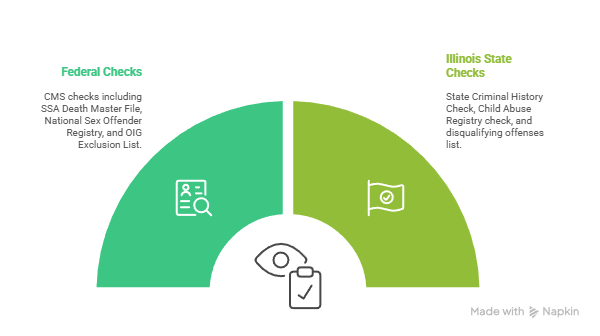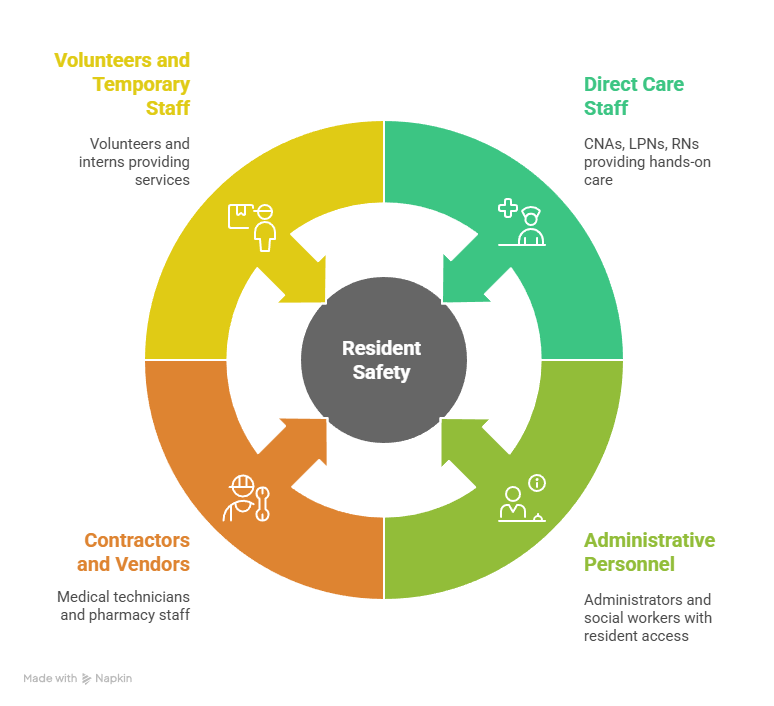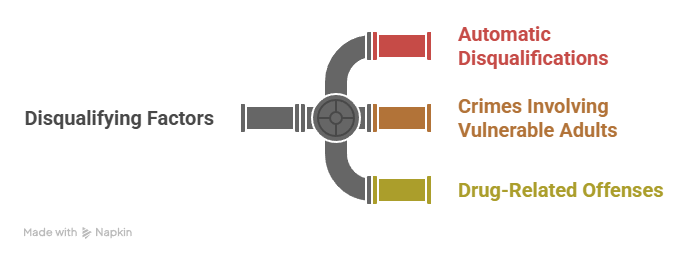Working in Illinois nursing homes requires passing comprehensive background checks designed to protect vulnerable residents. Whether you're a certified nursing assistant, registered nurse, or support staff member, understanding the background check process is essential for securing employment in long-term care facilities across the state.
Key Takeaways
- To work in Illinois nursing homes, you must pass detailed background checks to ensure resident safety.
- Illinois conducts rigorous state and federal background checks, including checks through criminal databases and exclusion lists.
- The background check process involves strict timelines, allowing a 60-day conditional work period while awaiting results.
- You must undergo background checks if you have direct or indirect resident contact, including CNAs, nurses, and administrative staff.
- New technology in background checks speeds up processing times and minimizes errors, benefiting both job seekers and employers.
Introduction

Illinois maintains some of the most thorough healthcare worker screening requirements in the nation, combining federal mandates with state-specific regulations. This guide provides healthcare workers with everything needed to navigate the background check process successfully, from initial application through final approval.
As a seasoned human resources professional working with long-term care staff, I've found background screenings to serve a function outside of the employment process; they act as a vital protection of our most vulnerable residents. When someone becomes a part of a nursing home staff in Illinois, we are not merely evaluating qualifications; we are positively confirming that we put our trust in the right person. With every clearance that is issued, we affirm that a family gets a boost of confidence in our protection of a loved one under our care. Such a responsibility goes beyond compliance; it involves a deeper ethical mandate. I therefore approach every background check with the gravity that such a task demands, since values of dignity and safety come first and can never be compromised.
Understanding Illinois Nursing Home Background Check Requirements
Illinois Department of Public Health (IDPH) Regulations
The Illinois Department of Public Health plays a crucial role in the healthcare background check process for nursing home employees, managed through the Health Care Worker Background Check Program. This program ensures that only qualified and trustworthy individuals work in environments involving vulnerable populations. The regulatory framework is robust, encompassing both federal and state guidelines to ensure comprehensive screening.
Key regulations are defined under Illinois Administrative Code Title 77, Part 955, which lays out the specifics of screening requirements. Furthermore, the Health Care Worker Background Check Act (225 ILCS 46) details various disqualifying offenses and the procedures to follow when those offenses are found. These state-specific rules complement federal requirements set by the Centers for Medicare and Medicaid Services (CMS), adding layers of scrutiny to protect residents.
Federal mandates include checks against the Social Security Administration Death Master File, the National Sex Offender Registry, and screenings from the Office of Inspector GeneralâÂÂs exclusion list. Meanwhile, Illinois implements additional checks, such as the state criminal history repository and the Department of Children and Family Services child abuse registry. These features go beyond the federal baseline to address regional concerns and priorities, providing a more localized approach to safeguarding residents.
This dual system of checks ensures that individuals who meet both state and federal criteria can provide a safe and supportive environment. As a healthcare worker, understanding these requirements helps you prepare and comply efficiently, ensuring a smoother path to employment. Are you ready to navigate this comprehensive process with confidence and clarity?
Federal vs. State Requirements

When you're applying to work in an Illinois nursing home, it's crucial to understand both federal and state background check requirements. The federal requirements are driven by the Centers for Medicare & Medicaid Services (CMS). They focus on several critical checks:
- Social Security Administration Death Master File: This check ensures no identity fraud by verifying that the Social Security number belongs to a living person.
- National Sex Offender Registry: All potential employees are screened against this list to ensure they do not have a history of sex offenses that could jeopardize resident safety.
- Office of Inspector General (OIG) Exclusion List: This list identifies individuals excluded from participating in federally funded healthcare programs.
On the state side, Illinois builds upon these federal standards. Here's how:
- State Criminal History Repository Check: Illinois requires a detailed check through the Illinois State Police to catch any offenses overlooked by federal screens.
- Child Abuse Registry: The Department of Children and Family Services provides another layer of protection, ensuring that the applicant has no history of child abuse. While not directly related to elderly care, this check emphasizes the state's commitment to thorough scrutiny.
- Disqualifying Offenses: Illinois has additional offenses that disqualify applicants beyond those listed federally. Even if you clear federal checks, certain state-specific offenses could halt your employment prospects.
Understanding these protocols helps you be well-prepared as you apply. Are your records in order? Have you considered these layers of scrutiny? Knowing both federal and state expectations ensures you're ready to navigate Illinois's detailed background check landscape.
Timeline Requirements
The timeline is strict. An initial background screening should start before employment begins. You're allowed to work conditionally for up to 60 days while waiting for your results. Expect a final clearance within 90 days of your hire date. Remember, renewals are necessary every five years, ensuring ongoing compliance throughout your career.
In navigating these checks, understanding what is required at each step can help streamline your path to employment. Knowing the regulations gives you a better chance to prepare and address potential issues proactively. Are you ready to start this process, and do you have all your necessary documents prepared?
Who Must Undergo Background Checks

Direct Care Staff and Healthcare Workers
If you're working as a direct care staff member in an Illinois nursing home, you're directly involved in providing care to residents. This includes Certified Nursing Assistants (CNAs), Licensed Practical Nurses (LPNs), Registered Nurses (RNs), and other professionals like therapists, dietary staff, and even housekeeping if they have resident contact. The law mandates that you must undergo a thorough background check.
For CNAs, this process verifies your training and disciplinary history through the Nurse Aide Registry. It ensures that those caring for vulnerable populations have clean records and the necessary qualifications. If you are an LPN or RN, your background check will include additional screenings such as verification through the Office of Inspector General's exclusion list, preventing anyone barred from federal healthcare work from employment.
Every step of this process ensures the safety and well-being of nursing home residents. The requirements might seem stringent, but they serve a crucial purpose. Have you considered how these checks might impact your job search or current employment? Preparing in advance with all necessary documentation can save you time and reduce stress, helping you focus on providing quality care once you're on the job.
Administrative Personnel with Resident Access
If your job brings you in contact with residentsâÂÂeven if you're behind a deskâÂÂa background check is essential. This includes administrators and assistant administrators, as well as social workers and case managers. Anyone with direct access to residents, regardless of job title, must pass a background check.
Contractors and Vendors
In the realm of Illinois nursing homes, contractors and vendors serve an essential role. This includes medical equipment technicians, pharmacy staff, and contracted healthcare providers. You might wonder why these positions require background checks. The answer is straightforward: even though they arenâÂÂt direct employees, they still interact with residents and their environments, impacting care and safety.
For instance, a medical equipment technician might access various areas of a facility. Ensuring they have a clean record is fundamental to maintaining a safe environment for those residing there. Similarly, pharmacy staff handle medications critical to resident health, making background checks imperative to prevent mismanagement or theft.
Illinois mandates that these individuals undergo the same rigorous background checks as direct care staff. This includes checks against the Illinois Department of Children and Family Services child abuse registry and the state criminal history repository. ItâÂÂs not just a question of compliance; itâÂÂs about safeguarding the trust placed in healthcare facilities.
Are you a contractor or vendor aiming to work with nursing homes? Be prepared for these checks and have your documentation ready to facilitate the process. Consider how your access might influence resident safety and the overall trust in the facility. It's worth reflecting on your own practices and protocols to enhance safety promises.
Volunteers and Temporary Staff
Volunteers, temporary agency workers, or even student interns are not exempt. If they're regularly providing direct services, they too must undergo a background check. Whether permanent or temporary, anyone with resident interaction is subject to the same rigorous standards.
Taking these steps ensures not only compliance with Illinois laws but also the safety and well-being of those in these care facilities.
Types of Background Checks Required
Criminal History Screening
Criminal background checks are a linchpin of the vetting process. They include thorough examinations by both state and federal entities to ensure a comprehensive view of an applicantâÂÂs history. At the state level, the Illinois State Police conduct checks through their criminal history repository. This captures any in-state offenses that an applicant might have on their record.
At the federal level, the process taps into FBI resources. The National Crime Information Center (NCIC) is utilized to identify any offenses that may have occurred in other states. This dual-level screening ensures that no pertinent information slips through the cracks, providing a clear picture of an individualâÂÂs suitability for employment in nursing homes.
Health Care Worker Background Check Program
This centralized program is a streamlined hub for processing background checks specifically for healthcare workers in Illinois. Employers can quickly verify prospective employeesâ backgrounds electronically. The system utilizes a set of standardized criteria, making it easier for facilities to comply with state requirements and expedite the hiring process.
Office of Inspector General (OIG) Exclusion List
Screening against the OIG Exclusion List is non-negotiable for those seeking roles in federally funded healthcare facilities. This check shows whether an individual is prohibited from participating in Medicare, Medicaid, or other federal health programs. Being on this list makes one ineligible for employment in many healthcare contexts, ensuring high standards and safeguarding these programs from fraud or abuse.
Nurse Aide Registry Verification
The Nurse Aide Registry Verification is specific to Certified Nursing Assistants (CNAs). It confirms the status of the CNAâÂÂs certification, checks for any disciplinary actions, and ensures that those seeking employment are in good standing. This verification is a key step in maintaining trust in the workforce, ensuring that all CNAs meet the necessary professional standards before engaging in patient care.
Each of these checks serves a distinct purpose in the broader effort to maintain safe and qualified staffing in Illinois nursing homes. They collectively form a rigorous framework that protects both residents and the integrity of the healthcare system.
The Background Check Process Step-by-Step
Initial Application and Documentation
Start your background check journey with a solid application. Gather your identification documentsâÂÂdriver's license, Social Security card, and proof of residence. Include your professional credentials like licenses or certifications. Your application should also list work history, educational background, and references. This paperwork lays the foundation for the checks that follow.
Fingerprinting Requirements
One essential step in the background check process is fingerprinting. This involves capturing your fingerprints electronically, which authorities then use to check against state and federal criminal databases. Here's what you need to know:
- Schedule an Appointment: Reach out to authorized fingerprinting services. Many candidates opt for scheduling at Illinois State Police facilities or through approved vendors. Depending on your location, some healthcare facilities may also provide fingerprinting services for convenience.
- Complete Fingerprint Capture: During your appointment, trained personnel will electronically scan your fingerprints. The process is quick, usually taking less than 15 minutes. Make sure to bring a valid photo ID to verify your identity.
- Fees: Be prepared to cover the fingerprinting fees. These typically run around $30, but prices can vary by provider. Always request a receipt as proof of payment, which you might need later in the hiring process.
Choosing a convenient location and familiarizing yourself with what to expect can reduce stress and ensure that this part of the application process goes smoothly. Have you considered how this brief appointment plays a crucial role in your career path? It's not just a formality but a step towards providing safe and respectful care to your future residents.
Processing Timeline and Fees
You can expect the background check process to take between two and four weeks from start to finish. Once you've submitted your application, the review typically takes about 3-5 business days. The criminal history check might require an additional 5-10 business days. When planning for a new position, factor in this timeline for a smoother transition.
The cost is also an essential consideration. In Illinois, the typical fee for the entire background check process is around $59 per applicant. This includes charges for fingerprinting and any associated administrative expenses. Keep these costs in mind as you prepare for your new role, and ensure that you have set aside the necessary funds.
Understanding both the timeline and fees upfront can help you navigate the process effectively and avoid any potential employment delays.
Receiving Results and Next Steps
Once your background check is complete, results will typically fall into one of four categories: Cleared, Conditional, Disqualified, or Incomplete. Here's what each means for you:
- Cleared: You've passed all checks without issues. You can start your employment as planned.
- Conditional: There are minor concerns, but you might still be eligible for employment while further checks are processed. Coordinate closely with your potential employer to resolve these quickly.
- Disqualified: Unfortunately, the results indicate disqualifying information. This might include certain criminal convictions or other red flags. You will receive details about these findings and information on how to appeal if you believe there is an error or mitigating circumstances.
- Incomplete: Some aspects of the check couldn't be completed, possibly due to missing information or unclear records. Follow up with your employer and the relevant screening agency to provide any additional details they may require.
Once you receive your results, plan your next steps based on your employment status. If youâÂÂre cleared or conditionally approved, itâÂÂs time to discuss start dates with your employer and ensure all paperwork is finalized.
For those receiving disqualified or incomplete results, engaging with the appeal process can be crucial. Review all documentation closely, gather any corrective information, and seek legal advice if necessary. Remember, thereâÂÂs a 30-day window for appeals, so act promptly.
Getting through a background check can be stressful, so use this time as a learning experience. Whether you start your role immediately or need to appeal, stay proactive in your communications and remain focused on your goal of joining the healthcare workforce.
Disqualifying Factors and Offenses

When it comes to working in Illinois nursing homes, certain offenses can automatically disqualify you from employment. These are not gray areas; these offenses are clear-cut reasons for denial. Understanding these can save time and energy if you're considering a career in this field.
Automatic Disqualifications Under Illinois Law
For starters, if you've been convicted of crimes against persons such as murder, manslaughter, or assault, you're facing a hard no. Illinois law takes these crimes seriously due to the vulnerability of nursing home residents.
Sexual offenses are another category of automatic disqualifications. This includes any sexual crime, harassment, or indecent exposure. The priority is to ensure the safety and dignity of residents who may not always be capable of advocating for themselves.Financial crimes also make the list, including theft, fraud, and embezzlement. Trust is paramount in healthcare settings, where you may have access to residents' or facility finances.
Crimes Involving Vulnerable Adults
Abuse or exploitation of vulnerable adults is a deal-breaker. If you've been involved in physical abuse or financial exploitation of the elderly or disabled, nursing homes in Illinois won't overlook these offenses. The facilities aim to provide a secure environment for everyone.
Drug-Related Offenses
While some states have relaxed their stance on various drug offenses, Illinois nursing homes remain strict. Illicit drug manufacture or distribution, along with multiple DUI offenses, can bar you from employment. These offenses imply a risk factor that facilities are not willing to entertain.
Appeal Process for Disputed Results
Let's say you believe your case deserves another look. Illinois offers an appeal process. You have 30 days to start this process following a disqualifying decision. Your success hinges on supplying solid supporting documents. Evidence of rehabilitation, strong character references, and proof of time elapsed since your offense can all support your appeal.
Understanding these disqualifications helps you prepare a stronger application or decide if pursuing this line of work is feasible. Knowing what could disqualify you also gives you the chance to gather evidence for potential disputes or rehabilitation documentation. The upfront effort can clarify your path or prompt you to explore other rewarding careers.
Employer Responsibilities
As an employer in the Illinois nursing home sector, your role in the background check process is critical. Establish clear, comprehensive screening procedures that comply with the Illinois Department of Public Health requirements. Before hiring, ensure you have a reliable method for documenting candidates' screenings. This documentation serves as a record of compliance, which can be important in audits or legal inquiries.
Once a candidate is hired, keep track of their background check timeline. You're allowed to employ someone conditionally for up to 60 days while waiting for background check results. ItâÂÂs essential to plan accordingly, so your staffing needs are met without risking non-compliance.
The obligation of ongoing monitoring can't be overstressed. Keep an eye on any new charges against employees and conduct re-screenings every five years to ensure continued eligibility. Use automated systems if possible to track when these checks are due, reducing the risk of oversight.
Navigating background checks can be complex, but staying organized and diligent helps. Are your documentation practices up to date? Have you scheduled periodic reviews of your procedures to ensure compliance with any regulatory changes? Answering these questions can significantly strengthen your position as an employer in this field.
Employee Rights and Protections
Due Process Rights During Screening
You have the right to know the results of your background check. If the results contain inaccuracies, you can dispute them. You donâÂÂt have to accept errors that may affect your career. Engage in the appeal process actively if needed.
Right to Appeal Adverse Decisions
If you receive an unfavorable background check decision, you can appeal. Act quickly, as you typically have 30 days to begin this process. Successfully appealing may require evidence of rehabilitation or character references.
Rehabilitation and Waiver Considerations
For those with past convictions, Illinois offers potential waivers if you can show rehabilitation. Demonstrate that a significant time has passed since the conviction and evidence of positive change in your life. Employers and regulatory bodies can consider these factors in their decision-making process.
Do you understand your rights fully? Exercising these can significantly impact your ability to work in a field dedicated to caring for others. Always be informed, proactive, and prepared to advocate for yourself.
Common Challenges and Solutions
The background check process for nursing home employment in Illinois can pose several challenges. However, with a practical approach, you can overcome these hurdles effectively.
| Common Challenge | How to Handle It |
|---|---|
| Delays in Processing Times | Background check delays can stall your start date. Submit complete, accurate paperwork and follow up regularly with the agency. Keep records of all communication. |
| Incomplete or Inaccurate Records | Errors in your background check can cause issues. Act quicklyâÂÂget certified copies of your records and seek legal help if needed to correct discrepancies. |
| Out-of-State Criminal History | If youâÂÂve lived in other states, provide your full address history. Expect longer timelines for interstate checks and verify old records in advance to avoid delays. |
The key is to approach each challenge with a clear plan and a proactive mindset. By doing so, you set yourself up for a smoother background check process and a quicker path to obtaining the job you seek.
Best Practices for Job Seekers
When you're looking to work in an Illinois nursing home, preparation is key. Start with gathering all necessary documents well in advance. YouâÂÂll need identification, your Social Security card, proof of residency, and relevant professional licenses. Make sure these documents are current and easy to access. This proactive approach prevents delays in your background check process.
Look into your history for any potential issues. If you have past infractions, be ready to address them. Collect evidence of rehabilitation, such as letters from past employers or proof of community service. These documents can be invaluable if you need to appeal a decision.
While waiting for background check results, use your time wisely. Consider gaining new skills or certifications that enhance your qualifications. Online courses in patient care or healthcare management could be beneficial. Engaging in professional development shows initiative and can make you a more attractive candidate.
Network with others in the field. Join healthcare forums, attend local workshops, or participate in community events related to nursing care. Building connections can provide support and open job opportunities.
Remember, straightforward preparation and personal growth during this period can vastly improve your chances of securing a position in an Illinois nursing home. Also, stay informed about any changes in requirements to ensure you're always one step ahead in your job search.
Conclusion
Illinois' comprehensive background check requirements for nursing home workers reflect the state's commitment to protecting vulnerable populations while maintaining high standards in healthcare. By understanding these requirements, preparing thoroughly, and following the proper procedures, healthcare workers can successfully navigate the screening process and contribute to quality care environments. Whether you're a new applicant or an experienced professional, staying informed about these regulations ensures compliance and supports your career goals in Illinois' healthcare sector.
Frequently Asked Questions
What is the background check act for health care workers in Illinois?
The Illinois Health Care Worker Background Check Act requires background checks for individuals seeking employment in health care facilities. This law ensures that potential employees do not have disqualifying convictions that could jeopardize patient safety.
How do I check my background in Illinois?
You can request your criminal background information from the Illinois State Police. Visit their website to request a Criminal History Report. There may be a fee and identification requirements.
What disqualifies you from being a caregiver in Illinois?
Convictions for certain offenses can disqualify you from being a caregiver. These include violent crimes, certain sexual offenses, and theft-related crimes. Rehabilitation can sometimes allow disqualified individuals to seek a waiver.
What is the new background check law in Illinois?
Illinois has enacted the Employee Background Fairness Act, which restricts the use of criminal background checks in employment decisions. Employers are encouraged to evaluate candidates based on qualifications rather than past offenses.
What disqualifies you from getting a nursing license in Illinois?
Disqualifications for a nursing license can include convictions for violent crimes, sexual offenses, and substance abuse issues. Each case is reviewed individually, and mitigating circumstances may be considered.
What disqualifies you from being a CNA in Illinois?
Similar to other health care roles, CNAs may be disqualified for convictions like violent crimes or abuse. Illinois requires background checks to determine eligibility.
What is a level 2 background check in Illinois?
A level 2 background check includes fingerprint-based checks and reviews state and national records for criminal history. It's more thorough than standard checks.
Can a felon work in the medical field in Illinois?
While certain felonies may disqualify someone from working in health care, there are exceptions. Some opportunities exist for felons, especially if they can demonstrate rehabilitation.
What is the Employee Background Fairness Act in Illinois?
This Act limits how employers can use criminal records in hiring decisions. It promotes fair chance employment and encourages hiring based on skills and qualifications over past offenses.
How can I appeal a disqualification from a health care position in Illinois?
If disqualified, you can appeal the decision by providing evidence of rehabilitation or requesting a waiver. Contact the Illinois Department of Public Health for guidance on the process.
Can I work in health care if I have a misdemeanor in Illinois?
Misdemeanors may not automatically disqualify you. The nature of the offense and its relevance to your role are considered. Discuss your status with potential employers for clarity.
Are there exceptions to the background check requirements for health care workers in Illinois?
Some volunteer positions may have different standards, but most healthcare roles require thorough background checks without exceptions.
What should I do if my background check contains errors in Illinois?
If you find errors, contact the Illinois State Police to dispute inaccuracies. Providing accurate documentation can help resolve discrepancies in your record.
Additional Resources
- Healthcare Worker Background Checks in Illinois: Licensing & Compliance
https://gcheck.com/blog/healthcare-worker-background-checks-in-illinois-licensing-compliance/ - What Kind of Background Checks Do Nursing Homes Do?
https://www.nursinghomeabusecenter.com/blog/what-kind-of-background-checks-do-nursing-homes-do/ - Illinois Compiled Statutes â Health Care Worker Background Check Act (225 ILCS 46)
https://law.justia.com/codes/illinois/chapter-225/act-225-ilcs-46/

GCheck Editorial Team
Meet the GCheck Editorial Team, your trusted source for insightful and up-to-date information in the world of employment background checks. Committed to delivering the latest trends, best practices, and industry insights, our team is dedicated to keeping you informed.
With a passion for ensuring accuracy, compliance, and efficiency in background screening, we are your go-to experts in the field. Stay tuned for our comprehensive articles, guides, and analysis, designed to empower businesses and individuals with the knowledge they need to make informed decisions.
At GCheck, we're here to guide you through the complexities of background checks, every step of the way.






